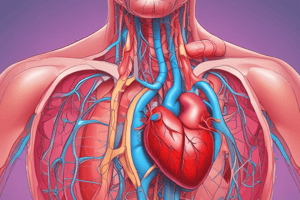Podcast
Questions and Answers
What is blood pressure primarily the result of?
What is blood pressure primarily the result of?
- The force exerted by blood against blood vessel walls (correct)
- The interaction between blood cells and oxygen
- The heart's electrical activity
- The friction between blood and vessel walls
During which phase is systolic pressure measured?
During which phase is systolic pressure measured?
- At the peak of ventricular contraction (correct)
- When the heart is completely relaxed
- While blood is returning to the heart
- During the filling of the ventricles
Which division of the autonomic nervous system primarily influences blood pressure through vasoconstriction?
Which division of the autonomic nervous system primarily influences blood pressure through vasoconstriction?
- Sympathetic division (correct)
- Parasympathetic division
- Enteric division
- Somatic division
What best describes peripheral resistance?
What best describes peripheral resistance?
What happens to blood pressure as it moves through the systemic and pulmonary pathways?
What happens to blood pressure as it moves through the systemic and pulmonary pathways?
Flashcards
Blood Pressure
Blood Pressure
The pressure blood exerts against blood vessel walls, driving continuous circulation.
Systolic Pressure
Systolic Pressure
Blood pressure peak during heart contraction.
Diastolic Pressure
Diastolic Pressure
Blood pressure during heart relaxation.
Peripheral Resistance
Peripheral Resistance
Signup and view all the flashcards
Blood Pressure Gradient
Blood Pressure Gradient
Signup and view all the flashcards
Study Notes
Blood Pressure
- Blood pressure is the pressure of blood against the inner walls of blood vessels, keeping blood circulating continuously.
- Blood pressure is highest in large arteries and decreases throughout the systemic & pulmonary pathways, reaching zero or negative at the vena cava.
Measuring Blood Pressure
- The heart's alternating contractions and relaxation cause a fluctuating blood flow in arteries.
- This fluctuation creates two arterial blood pressure readings:
- Systolic pressure: the peak pressure during ventricular contraction.
- Diastolic pressure: the pressure when the ventricles are relaxing.
Blood Pressure Factors
- Peripheral resistance: Friction the blood encounters as it travels through blood vessels.
- Neural factors:
- The parasympathetic nervous system has little effect on blood pressure.
- The sympathetic nervous system causes vasoconstriction (narrowing of blood vessels).
Studying That Suits You
Use AI to generate personalized quizzes and flashcards to suit your learning preferences.




